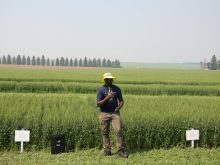Israeli-based ADAMA finds its workforce in turmoil following Hamas attacks on the country and the eruption of war
Fertilizer manufacturer ADAMA’s main production plants in Israel have been shut down before by rocket strikes from the Gaza Strip, but this month’s attack was different.
“I think what’s unique about this is the scale of the attacks and the scale of the subsequent conflict,” said ADAMA Canada general manager Cornie Thiessen, who visited the company’s Israeli operation in January.
ADAMA quickly got its main agricultural inputs plants back in operation after the terrorist massacres of Oct. 7, but its Israeli workforce is anything but back to normal.
Read Also

Huge Black Sea flax crop to provide stiff competition
Russia and Kazakhstan harvested huge flax crops and will be providing stiff competition in China and the EU.
“They’re dealing with the impacts on friends and family, and also now many of them are being called up to serve in the military,” said Thiessen Oct. 16.
ADAMA is the agricultural company most affected by the war, considering it is based in Israel. However, the country also produces a number of key commodities, such as natural gas and potash, and the war is raging in one of world trade’s most sensitive areas.
“There are some pretty important shipping lanes nearby,” said Thiessen.
The outbreak of the war saw many commodity prices such as those for oil, copper, gold and fertilizers initially jump, but there has not been a major, sustained commodity rally. If the conflict remains restricted to the Gaza Strip and Israel, few analysts expect major world economic impact.
If it spreads to Lebanon and Syria and draws in Iran, all bets are off.
Jacob Shapiro, a leading geopolitics and agricultural trade analyst, believes the conflict is unlikely to become a regional war.
However, if a general war does ignite, “then we are looking at a real spike in energy prices and agriculture will face derivative impacts.”
Shapiro thinks it is “nonsensical” to compare the U.S. vulnerability to an energy price shock to the situation in 1973, when the Arab oil embargo following the Yom Kippur War threw the United States into economic crisis and chaos.
The U.S. is now energy independent and much less sensitive to energy prices in its economy. For China, however, energy prices and availability are critically important because it is a net importer and major customer of Saudi Arabia.
The outbreak of the war saw January WTI oil futures jump from $80 per barrel to $85, but prices remain well below the $90 reached in September.
Israel is a small but significant supplier of natural gas to Egypt, and that flow has been broken for now.
It also produces about three percent of world potash supplies. Disrupting that could have a small but noticeable impact on world fertilizer flows and prices.
A wider war affecting the Suez Canal, Turkey or the Persian Gulf would have impacts impossible to confidently predict.
ADAMA was formed in the earliest years of Israel’s existence, with one of its parent companies being in operation before the 1948 founding of the independent nation after the first Arab-Israeli war.
It was part of the critical mass of science and chemistry based development that helped Israel become a technologically advanced society and economy, built in a land with few resources, harsh conditions and surrounded by enemies.
Thiessen said the industrial disruptions of the past two weeks shouldn’t affect the company’s ability to supply western Canadian farmers with inputs for the 2024 season. There should be no noticeable impact from the brief shutdowns.
For ADAMA, the impact is more on the human level.
In January, Thiessen stayed for a few days in a kibbutz in the Negev desert, the southern part of Israel close to the Gaza Strip. It’s a tense situation, where the people are “battle hardened” by years of living beside an area that fires rockets in their direction.
This time more than a few rockets came flying out of the Gaza Strip, and many more Israelis were killed than ever before, but for both Israel and ADAMA, dealing with the disruptions of terrorism and war are, sadly, nothing new.


















